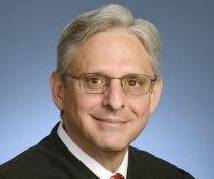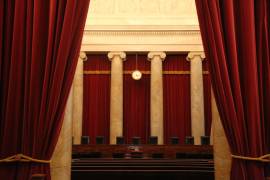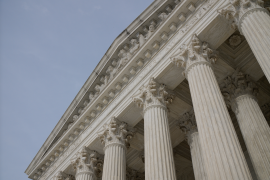
We Reviewed All of Judge Garland’s Record. Here's What We Found.
Blog Search
Following President Obama’s nomination of Merrick Garland, Chief Judge of the D.C. Circuit, to the U.S. Supreme Court last week, legal experts at Lambda Legal embarked on a comprehensive review of the nominee’s judicial record.
We considered all 359 opinions authored or co-authored by Judge Garland and analyzed other decisions in which he participated involving LGBT-identified and LGBT-affiliated parties, employment discrimination, reproductive rights, voting rights, criminal justice, rights of detainees, fair courts, or constitutional rights of equal protection, liberty, free speech, or religious exercise.
Our team found that Judge Garland does not have enough of a record in these cases to be able to confirm whether he possesses any anti-LGBT bias, or how he would approach critically important issues such as these were he confirmed for a seat on the Supreme Court.
Tell Senators to give Judge Garland a fair hearing and a swift vote. Sign the petition!
Although Judge Garland has participated in more than 5,000 decisions over the past 19 years, because he has served on the D.C. Circuit, an unusually high percentage of those cases involved review of federal agency decisions on technical, regulatory questions.
In addition, Judge Garland has been a particularly modest judge who has tended to define the issues on appeal narrowly, adhered closely to precedent, and frequently resolved cases on procedural rather than substantive grounds.
Our review found no smoking guns that would disqualify Judge Garland from a Supreme Court seat, but his collected cases do not tell us or America enough for a position of such importance.
That is why it is essential that the U.S. Senate do its job and hold hearings on his nomination. These hearings would allow for probing questions to be asked of Judge Garland that could lead to a clearer picture of his judicial philosophy and perspective on these issues of such great importance, not just to the LGBT community, but to all communities across this country.
Tell Senators: Do Your Job! Sign the petition today.
Our review found that there have been only four cases in which Judge Garland participated (none of which he authored an opinion in) that involved parties who identified as gay or who were affiliated with the LGBT community.
Although, in each of these four cases, he ruled against those parties, the legal issues directly presented on the appeals he participated in were general, and suggested little about his views on sexual orientation or gender identity related issues.
Below are the cases, and our analysis of each.
- Grid Radio v. FCC (2002) concerned the Federal Communications Commission’s ban on low-power FM radio stations. Grid Radio, an unlicensed low-power radio station catering to gay men, lesbians, and the arts community in Cleveland, was told by the FCC to cease operation and pay a $11,000 fine. Station management brought a case before a three-judge panel which included Judge Garland, claiming that the ban on low-power stations violated the First Amendment and the Communications Act of 1934 and that the penalty was excessive. Judge Garland joined an opinion rejecting these claims and supporting the FCC’s action against the station.
- Turner v. Department of Navy (2003) was an appeal by a former Navy officer who claimed he was punished for certain offenses, including alleged sexual assaults, and was subsequently discharged. Turner’s appeal principally addressed whether a commanding officer may impose disciplinary punishments for certain offenses without the intervention of a court-martial. The former officer, Jim Turner, further claimed that his supervisor violated the Department of Defense’s “Don’t Ask, Don’t Tell” policy. Judge Garland was part of a three-judge panel that upheld the dismissal without deciding whether “Don’t Ask, Don’t Tell” had been violated or whether violations of the policy could give rise to enforceable claims.
- International Action Center v. U.S. (2004) was an appeal brought by the International Action Center, a political association that, among other things, was opposed to oppression of LGBT people. It claimed that, on the day of President Bush’s inaugural parade in 2001, D.C. police officers pepper-sprayed participants in a peaceful protest action, while other officers did nothing to stop the attack. The only issue on appeal was whether supervisors in law enforcement can be held personally liable for damages resulting from improperly training officers if they had no knowledge of previous problems with those officers’ conduct. Judge Garland joined the unanimous decision affirming that supervisors could not be held personally liable without more direct culpability.
- Pinson v. Samuels (2014) examined whether Jeremy Pinson, a gay federal prisoner in Alabama, could receive a fee waiver for his suit seeking to challenge the transfer from D.C. to Alabama of another lawsuit he had filed seeking to be moved to a different prison unit based on his fear of harm due to his association with a gang and his sexual orientation. Judge Garland was part of a three-judge panel that found that Pinson, who had previously filed more than 100 civil cases and appeals, had not shown he was entitled to the fee waiver.
Judge Garland clearly has the academic and professional credentials to serve ably on the Supreme Court. And while his judicial record is important to analyze, as we have done, it is merely a starting point.
More than a week after Judge Garland’s nomination, obstructionists in the Senate have appallingly continued their refusal to give him a hearing. The hyper-partisan, deliberately dismissive attitude embraced by Senate leadership and majority members of the Senate Judiciary Committee toward even meeting with the nominee is not only antithetical to our democratic process, but also reflects a total disregard of the public’s expectation that their elected officials will do their jobs.
The bottom line is that we need a hearing and thorough vetting process in order to learn more about Judge Garland’s judicial philosophy. To that end, we are preparing a series of questions on a number of concerns affecting our communities and others that we believe should be asked at a confirmation hearing, which we plan to release in two weeks.
In the meantime, we encourage people to sign Lambda Legal’s petition urging the Senate to #DoYourJob.




